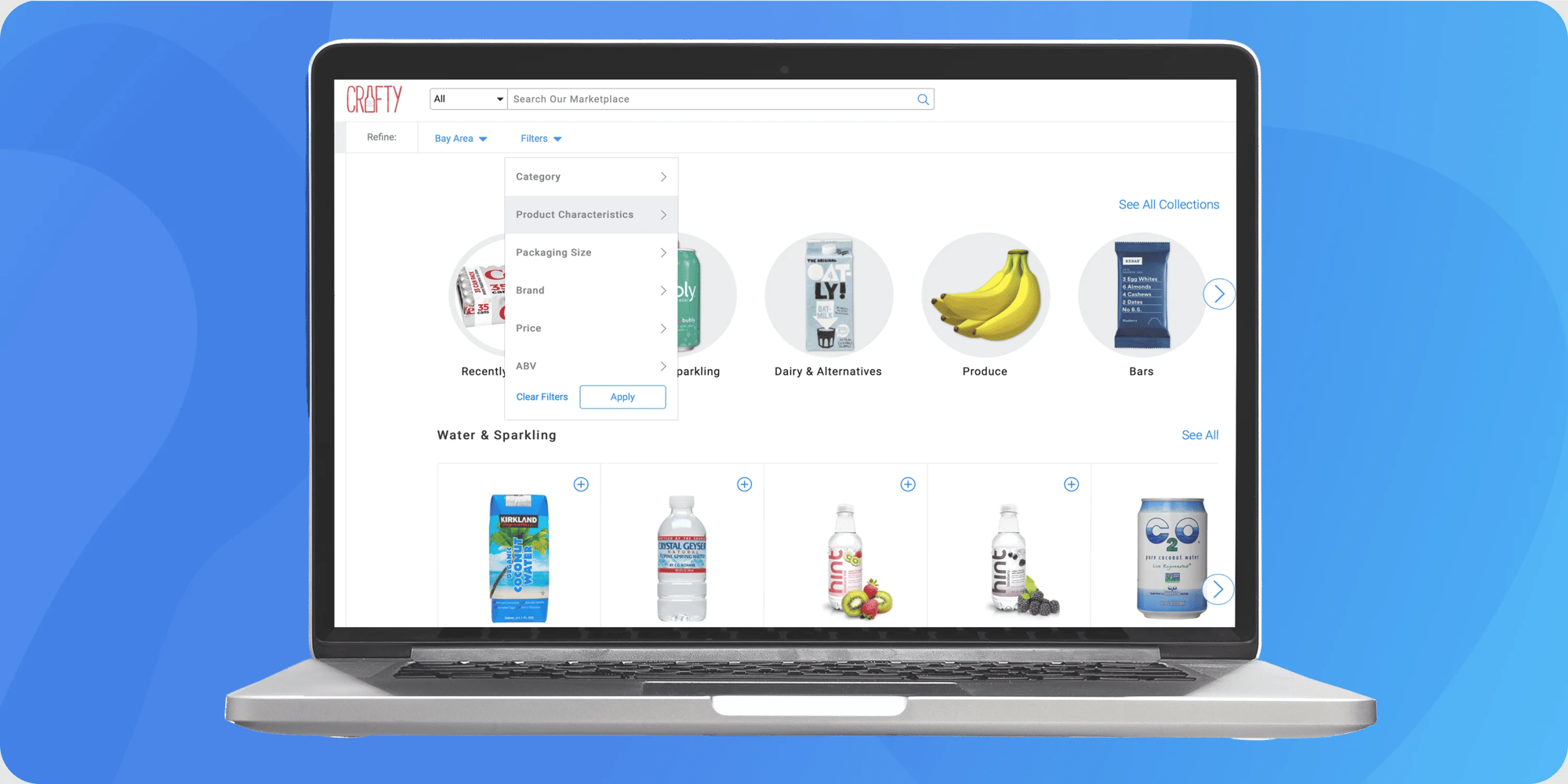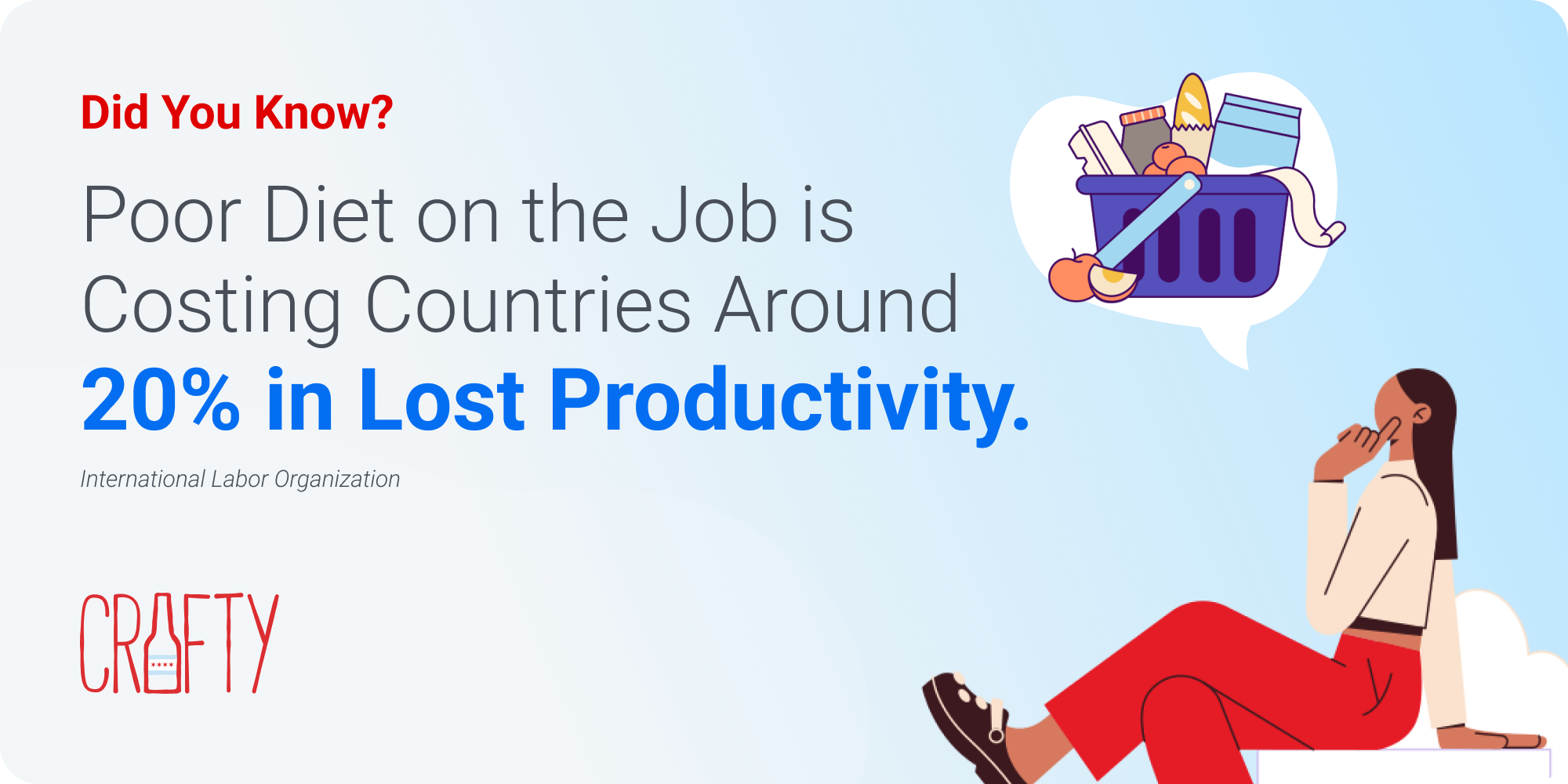The Foodie's Guide To Kosher Office Snacks
Everything you need to know to incorporate kosher snacks into your office pantry.
✍️ Written by Rebecca Ross
🕚 8-Minute Read • Updated Tuesday, October 22

These days, the key to a successful office snack program is including options that appeal to a range of backgrounds and preferences. The first thing that comes to mind is diet-related options, like gluten-free snacks, dairy-free, vegan, and so on. After that, our minds go to value-based options ranging from minority-owned, charitable, or sustainable brands. However, one that falls between the two and is often missed is Kosher items.
The top workplaces across the globe are prioritizing diversity initiatives when it comes to hiring, training, and even in their office kitchen and pantry space. Across Crafty clients, we saw an 88.12% increase in DEI-brand units ordered in 2023. Accommodating all preferences, whether for health, religion, or any other reason, is critical to attracting a diverse workforce.
We will be diving into the world of kosher options, which are the dietary guidelines around Judaism. These religious food guidelines are not only as important as your standard dietary restrictions, but they also ensure your office culture is embracing DEI initiatives to ensure you’re not excluding any employee from your incentive program. Kosher options are just the tip of the iceberg in religious food guidelines. For example, many who practice Hinduism and Buddhism follow vegetarian or even vegan diets, so don’t just stop here when exploring your options.
In this piece, we'll be unpacking the following:
- What is Kosher?
- Why Do You Need Kosher Options In Your Office Kitchen?
- Kosher Office Snack Staples
- How To Easily Celebrate Jewish Holidays At Your Company?
Ready to fill up your cup with knowledge?
What is Kosher?
As your friendly snackperts, we want to ensure we acknowledge that there are many texts with various interpretations from Jewish experts on this topic. We’re going to give you the basic rundown of Kosher or (Kashrut In Hebrew), so you have a starting point. If you’re interested in learning more, there is a wealth of knowledge available from those more versed in the topic.
Kosher: A set of dietary laws and regulations followed by Jewish people. These rules provide some guidelines on what foods can and cannot be consumed, how they should be prepared, and how they are served. There are many levels of kosher practice, and not all Jews practice kosher the same, if at all. Some Jews may just avoid bacon, while others eat vegetarian outside the home as they only eat kosher meat, and others may go all the way, only eating kosher both inside the home and out. It’s a spectrum.
Below will give you a rundown of the basics:
Kosher Animals:
A mammal is kosher if it has split hooves and chews its cud, and a water creature is kosher only if it has fins and scales. Birds are a bit tricky, but Jewish text outlines select bird species that are kosher. In summary, here is what is and is not OK.
Examples of items that are Kosher:
- Cows/Beef
- Chicken
- Turkey
- Sheep
- Goats
- Most fish
Examples of items that are NOT Kosher:
- Pigs/Pork
- Shrimp
- Crab
- Lobster
- Oysters
Of course, there are more in the yes and no column, but we just wanted to highlight some of the most common. There are also very specific rules on how the animal in question is slaughtered and cleaned before eating as well. That’s why there is a kosher certification to ensure the rules are being followed.
No Mixing Milk & Meat
Kosher laws require that meat and dairy products be prepared, served, and stored separately. Mixing these two categories is strictly forbidden. Households that keep strictly kosher have separate dishes, utensils, and even equipment for each.
There is also a waiting period between meals. If a person who keeps kosher has milk and cereal for breakfast, they must wait upwards of six hours until they can enjoy a chicken sandwich (without cheese).
Insect-Free Produce & Grains
Almost all fruit, vegetables, and grains are kosher at the core, but it does need to be cleaned so it’s insect-free. Insects are strictly not kosher, so cleaning is essential.
That said, those who keep kosher may be cautious of prepackaged or frozen foods, questioning the preparation. Again, this is where kosher certification comes into play. Even if frozen spinach is “kosher,” it could have been prepared with a meat knife or cooked in a dairy pan.
Pareve
Pareve is a term for food items that are not considered meat or dairy that can be eaten with either option. Alongside fruit, vegetables, and grains, you’ll find that fish can sometimes be considered pareve.
When looking at prepackaged goods, like office snacks or drinks, you’ll notice a symbol for something that is kosher-certified, along with a pareve symbol if it falls into that category. Pareve options are great for your office snack program as they can be enjoyed regardless of the type of meal your employee might have had for breakfast and lunch.
Again, these are just the basics, and there is probably a lot we left out. Here are a few resources you can explore this topic further by those that have more expertise:
2025 TRENDS REPORT
7 PREDICTIONS TO FUTURE-PROOF YOUR WORKPLACE
Discover seven research-backed predictions and actionable strategies to transform your workplace into a connection catalyst that drives meaningful results.
Why Do You Need Kosher Options In Your Office Pantry?
Food and beverage is a great gateway to understanding another person's culture and experience. Offering kosher options within your office kitchen shows respect and thoughtfulness for your employees’ backgrounds while also offsetting their food and beverage expenses.
On the Crafty side, we have seen an 89.31% increase in kosher units ordered compared to last year, showing the commitment to diverse options across top workplaces. The challenging part about continuing to offer these options is finding them. Workplace managers don’t have the time to sift through thousands of products trying to find out which ones are kosher, sustainable, or minority-owned. That’s why Crafty’s digital product catalog makes it easy to filter based on these product characteristics so you can find exactly what you need.

You can simply filter to show kosher products only and then pick the ones that speak to you. It’s that easy! Plus, as we stock your office kitchens with those products, you can get a birds-eye view into your offices’ consumption patterns to ensure you are stocking the perfect amount for your employees’ needs.
Top Kosher Snacks for Work
When planning your office pantry selection, you want to ensure you have staples that are always available to your employees. Then on special occasions, you can work with our team to introduce some seasonal options…we’ll get to that in a few.
You’d be surprised how many of your favorite office snacks are actually kosher, so you may already have a good mix in your office. That said, if you’re looking to add a few more kosher options, we recommend checking out these top kosher office snacks among Crafty clients.
Top Kosher Snacks:
- KIND Dark Chocolate Nuts & Sea Salt
- Kirkland Organic Hummus
- Stacy’s Pita Chips Simply Naked
- RXBar Chocolate Sea Salt
- Wholly Guacamole
Brand Spotlight
KIND
Not only is this popular office snack bar kosher but it’s also owned by Daniel Lubetzky, a Mexican-Jewish immigrant whose father is a Holocaust survivor. All the flavors are delicious, but favorites in the Crafty office are Dark Chocolate Almond Coconut or the Cranberry Almond + Antioxidant.

How To Easily Celebrate Jewish Holidays At Your Company
In Judaism, food typically plays a central role in most holidays, and it’s an excellent opportunity to incorporate those items into your office kitchen and pantry program to acknowledge your Jewish employees. We won’t get into every Jewish holiday because we will be here forever. Still, we will cover some of the more popular ones centered around food and provide easy ways to incorporate them into your office experience.
Shabbat:
While not a holiday like the others we will mention, Shabbat is celebrated every week from Friday night to Saturday night, with the food and drink stars being challah bread and wine. If you want to do something more regular, you could have both items in your office kitchen on Fridays for employees to enjoy.
Rosh Hashanah:
Celebrated in the fall, Rosh Hashanah is the Jewish New Year. Apples and honey are the central food element to celebrate a fruitful and sweet new year. Simply stock your kitchen with a selection of apples and honey the week prior to the holiday itself, as many Jews may take that day off if it falls on a workday.
Sukkot:
Sukkot takes place in the fall and is not a widely known Jewish holiday outside the community. It’s all about celebrating the bounties of nature during a time when the Jews lived outdoors. Enjoying fresh produce and special round challah under a shelter or Sukkah where you can see the stars is tradition. You could have a bounty of fresh ingredients in your office to celebrate and encourage your team to dine under a pergola in the courtyard or rooftop.
Hanukkah:
Hanukkah is an eight-day holiday that falls in the wintertime and celebrates the victory of the Maccabees. Chocolate coins called Gelt, Latkes, and Sufganiyot (jelly-filled donuts) are all part of the food traditions around this holiday. Basically, this is your sign to bring the whole team together over some fresh jelly donuts.
Tu B'Shevat:
Celebrate the trees during this Jewish holiday in late winter. Use this as an opportunity to incorporate products with ingredients like dates, figs, grapes, pomegranates, olives, and almonds.
Purim:
Purim falls in late winter or early spring and is a holiday that retells a specific story of Jewish people's perseverance during a time of persecution. To celebrate this specific Jewish triumph, the community typically dresses in costume, enjoys pastries called Hamantaschen (jam-filled triangle pastry cookies), and drinks LOTS of wine. It's a pretty great idea for a happy hour, if you ask us!
Passover (Pesach):
Passover is another widely known holiday in early to mid-spring. It tells the story of the Jewish liberation from slavery, where various food elements represent different aspects of the story. The most commonly known is Matzah, which is unleavened bread like a cracker to symbolize the bread Jews ate as they fled Egypt. This is a staple during the eight-day observance and is an easy addition to your office kitchen during this time, along with a few toppings or more protein-forward corporate catering options.
Conclusion
Tapping into food is an easy way to explore other cultures and use it as a springboard for getting to know your employees better. The goal is not to know everything but to understand the basics to be thoughtful when crafting your workplace experience to include everyone.
CRAFT
A BETTER
WORKPLACE
Elevate your office food and beverage program with enhanced services managed in one innovative, centralized platform.


